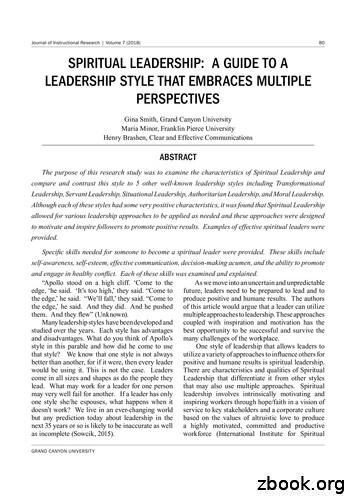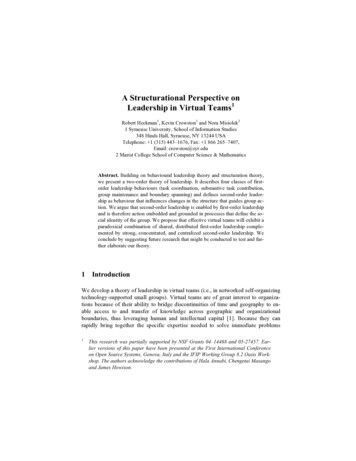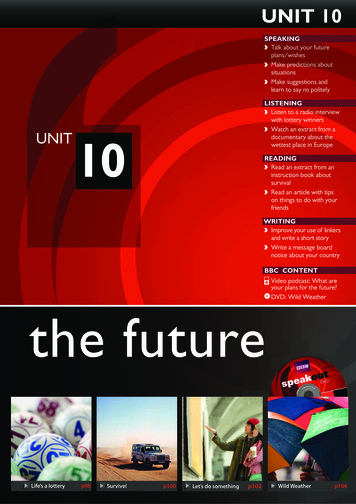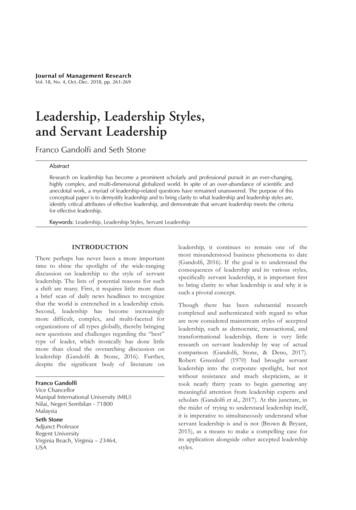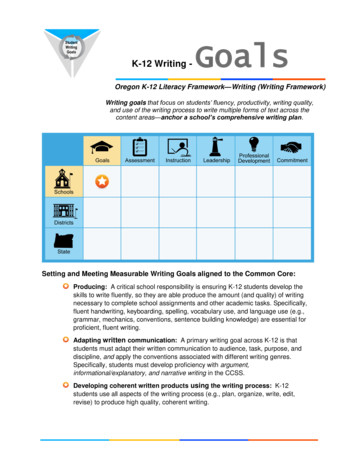Get Involved In DSBA Leadership!
Get Involved inDSBA Leadership!The Delaware State Bar Association is looking for a number of talented membersto join the 2017-2018 Executive Committee and lead DSBA to continued success.The following positions on the Executive Committee of the Association must be filled for the year 2017-2018:Vice President-at-Large; Vice President, New Castle County; Secretary; Assistant Secretary; Treasurer; AssistantTreasurer; Six Members-at-LargeNote: The Vice President, Kent County and the Vice President, Sussex County will be those persons selected by, respectively,the Kent County Bar Association and the Sussex County Bar Association.The following position must be filled for the term as noted:One (1) DSBA Representative to the Delaware Bar Foundation Board for a four-year termThe Nominating Committee wants to consider all interested candidates. If you are interested in serving onthe Executive Committee or would like to recommend a candidate, please send your name or the candidate’sname along with a CV and at least one letter of nomination to Mark S. Vavala, Executive Director, by emailat: mvavala@dsba.org or by mail at: Delaware State Bar Association, 405 North King Street, Suite 100,Wilmington, DE 19801 by February 14, 2017.WE NEED YOUR HELP TO FIND STRONG LEADERS FOR THE FUTURE!The Nominating Committee consists of:Yvonne Takvorian Saville, ChairRichard A. Forsten, Vice-ChairNew Castle CountyH. Garrett Baker (2017)David L. Baumberger (2017)Meghan Elizabeth Butters (2017)Carolyn G. Connors (2017)Michael B. Galbraith (2017)Andrew William Gonser (2017)Albert J. Roop V (2017)Danielle K. Yearick (2017)Rebecca L. Butcher (2018)Richard B. Carroll, Jr. (2018)Frederick L. Cottrell III (2018)Joel Friedlander (2018)Lisa B. Goodman (2018)Timothy Jay Houseal (2018)Kent CountyReneta L. Green-Streett (2017)Frederick A. Townsend III (2018)Myron T. Steele (2019)Douglas J. Cummings Jr. (2019)Alessandra Glorioso (2019)Tanisha Lynette Merced (2019)Norman M. Monhait, (2019)Mark Minuti (2019)Michael P. Migliore (2019)Michael G. Owen (2019)Sussex CountyJohn F. Brady (2017)Julianne E. Murray (2018)Kathi A. Karsnitz (2019)Delaware State Bar Association405 N. King Street, Suite 100Wilmington, Delaware 19801(302) 658-5279
DSBA BAR JOURNALJANUARY 2017 VOLUME 40 NUMBER 6PRESIDENTMiranda D. CliftonEXECUTIVE DIRECTORMark S. VavalaEDITORIAL BOARDDavid W. deBruinBenjamin A. SchwartzSeth L. ThompsonEXECUTIVE COMMITTEE LIAISONDavid J. Ferry, Jr.PUBLICATIONS EDITORRebecca BairdPUBLICATION ASSISTANTSJanice MyrickSusan SimmonsThe Bar Journal is published and distributedby the Delaware State Bar Association405 North King Street, Suite 100Wilmington, DE 19801P: 302-658-5279F: 302-658-5212www.dsba.org Copyright 2017 by the Delaware StateBar Association. All Rights Reserved.The Bar Journal is the independent journalof the Delaware State Bar Association. Itis a forum for the free expression of ideason the law, the legal profession and theadministration of justice. It may publisharticles representing unpopular andcontroversial points of view. Publishingand editorial decisions are based on thequality of writing, the timeliness of thearticle, and the potential interest to readers,and all articles are subject to limitations ofgood taste. In every instance, the viewsexpressed are those of the authors, andno endorsement of those views should beinferred, unless specif ically identified as thepolicy of the Delaware State Bar Association.The Bar Journal is published monthly with acombined July/August issue.All correspondence regarding circulation,subscriptions, or editorial matters should bemailed to:Editor, DSBA Bar JournalDelaware State Bar Association405 North King Street, Suite 100Wilmington, DE 19801or emailed to: rbaird@dsba.orgLetters to the Editor should pertain to recentarticles, columns, or other letters. Unsignedletters are not published. All letters aresubject to editing. Send letters to the addressabove, Attention: Editor, Bar Journal.For Advertising OpportunitiesCall (302) 658-5279, ext. 102Email: rbaird@dsba.orgRead The Bar Journal online atwww.dsba.orgFEATURES2Call for Executive Committee Nominations8Photographs from the 2016 Awards Luncheon14 Third Annual DELREC Casino Night Raises 11,000 forLegal ProgrammingBY KYLE EVANS GAY, ESQUIRE, AND JOHN G. DAY, ESQUIRE20 Dr. Martin Luther King, Jr. Annual Breakfast and StatewideDay of Service Registration and Sponsorship Information25 Nominations Sought for Law Day Awards35 2017 Delaware Legal Directory Order FormCOLUMNS4President's Corner26DE-LAP Zone6Editor’s Perspective28LOMAP for the Delaware Lawyer12Tips on Technology29Views from the Senior Lawyer16Ethically Speaking30Book Review22Access to Justice Spotlight34Judicial PalateDEPARTMENTS8DSBA Happenings11Section & Committee Meetings9Side Bar32Bulletin Board9Why I Belong33Disciplinary Actions10Calendar of Events33Of NoteCover Photo Credit: istockphoto.com/ wujekjeryDSBA Bar Journal January 20173
PRESIDENT'S CORNERBy Miranda D. Clifton, EsquireBlank PagesAh, the feeling of a new beginning.I remember my first attorney job.I started with a lot of blank legalpads and brand new pens. My calendar was relatively empty and my file drawerhad lots of room. It truly was a new beginningand I was master of my own destiny.A fresh perspective and a new start are thebasis for the most global of celebrations, NewYear’s Day. I enjoy watching other countries’celebrations as time marches across the globeannouncing a new year of hope and promise.Here in the United States, people crowd intoTimes Square with limited room for movement,and even more scarce bathroom facilities, withone thought in mind to usher in the newyear with style.Following our traditions, I formalize theblank page of a new year even more by creatingformatting changes for my life on this blankpage, otherwise known as New Year’s resolutions. Sometimes, these self-proclaimed vowsstick, but unfortunately, many times they donot and I see a repeat resolution year after year(sometimes going decades).You see, we all need blank pages in our lives.These blank pages give us hope and promise.Each of us needs to be reminded that no matterthe missteps or self-perceived failures, that wecan re-write our future. We do not have to bestuck in our ruts, routines, and mindsets. Wecan change the way we think. Old dogs cancertainly learn new tricks.4DSBA Bar Journal www.dsba.org istockphoto.com/ kieferpixI can capture that feeling of newness to asmaller extent when I flip my legal pad to aclean, new page. I am not dealing with yesterday’s doodles and impossible tasks on mynew page. I am looking at the possibilities andnew challenges ahead.I recently cleaned out the bookshelves and drawers in my office and wasastonished at all of the clutter I had accumulated over the last ten years. Ihad magazines and journals that were of no use anymore. I also ran acrossreference materials that were extremely outdated. I found meeting agendasfor organizations that did not even exist anymore. At one point in my life,I felt that all of these materials were important enough to save. However,with the passage of time, they had just become a burden and an obstacle.As refreshing as a new page can be, that “new” feeling is enhanced whenyou combine that new page with disposing of redundant and outdated oldmaterial and mindsets. As attorneys, we carry a lot of baggage around withus constantly (if you do not believe me, just go through your briefcase sometime). Some of our baggage is essential for what we do everyday, but otherbaggage is carried merely “because we have always carried it.” Strangelyenough, it is the unnecessary baggage that is the heaviest and seems to takethe pleasure out of our everyday activities. Take time to weed the unnecessary. The unnecessary “stuff ” we carry is heavier than you think and hasthe tendency to drag you down and cause you unnecessary stress.The great thing about a blank page is that you can turn the page anytime. We focus on change and priorities as a January 1st project. However,the date really is arbitrary. What is to stop us from deciding today to institute a change or just to put some sour issues or practices that are not reallyworking anyway behind us?
Here we are now mid-Januar y.Chances are that resolutions have beenbroken already and the year alreadyseems a little tarnished. Take heart, legalwarrior, all is not lost. We do not have towait until January 1, 2018 to start again.You have the option to turn to a blankpage today.Miranda “Mindy” Clifton hasgraduated from every college andun i ver s i t y b e g i n n i n g w i t h a “ W ”including Wesley (BS), Widener (JD) andWilmington (MBA). She is the currentPresident of the Delaware State BarAssociation. In her spare time, Mindy isa Trial Attorney for Nationwide MutualInsurance Company and represents itscustomers in almost every court in allthree counties throughout the State.Mindy is also an adjunct professor forWilmington University in their GraduateBusiness Studies. She can be reachedat cliftom2@nationwide.com.DSBACLEWORKERS' COMPENSATIONBREAKFAST SEMINARWEDNESDAY, JANUARY 18, 2017 Chase Center on the Riverfront8:30 A.M. – 12:00 P.M.815 Justison St., Wilmington, DEREGISTRATION AND BREAKFAST: 8:00 A.M. – 8:30 A.M CLE SEMINAR: 8:30 A.M. – 12:00 P.M.3.3 hours CLE credit for Delaware and Pennsylvania attorneys 3.0 hours DE Insurance Continuing Education Licensee creditsPROGRAM HIGHLIGHTS:Keynote Address by The Honorable Robert B. YoungNally and Successive Carrier LiabilitySubrogation – Who Pays Who and WhenCase Law & Regulatory UpdateMaking Appeals AppealingSponsored by The Workers' Compensation Section of the Delaware State Bar AssociationVisit www.dsba.org for more information and to register.We believein buildingrelationshipsWe believein buildingrelationships.KruzaLegalS earchKruzaLegalS earchin permanentattorney,paralegalsupportservicesstaff placementservices since 1980Specializing inSpecializingpermanent attorney,paralegaland supportstaffandplacementsince 1980.Kruza Legal SearchKruza Legal Search1845 Walnut Street,Suite 8551845 WalnutStreet, Suite 855Philadelphia, PA19103Philadelphia,PA 19103215.981.5455 /215.981.5455phone/ phone215.981.0662 215.981.0662/ fax/ faxwww.kruza.comwww.kruza.comPeggy KruzaSteven KruzaPeggy KruzaSteven WeilerSteven KruzaSteven WeilerDSBA Bar Journal January 20175
EDITOR’S PERSPECTIVEBy Benjamin A. Schwartz, EsquireI Just Want to Share This With You Thirteen thousand, eight hundred, and twenty onewordsFrom time to time, instead of calling my office and requesting an appointment to speak with an attorney, a prospectiveclient will just email me directly about their case. Rather thangive a trimmed-down version of the events giving rise to theirprospective legal claim, folks will on occasion unload a torrentof detail, telling me everything I could possible want or needto know (and more). Recently, I received an email so long thatI had to run a word count: 13,821 words!Discriminationdeposition was scheduled by the defense attorney, Tom Leff,at his office in Wilmington. Anyone who has litigated a casewith Tom knows that he is an extremely effective trial lawyer,but not because he is intimidating and mean. He has an open,approachable, easygoing, humble style that seems well-craftedto ease the opposing party into saying too much, being toohelpful to the defense, or just plain liking “that nice man fromState Farm” so stinking much that they no longer want to suehis client, and feel like settling.My client in this auto accident case had several years priorneeded some diapers or baby food in the dead of winter whenshe was out-of-work and very short on cash. As a result, shestole what she needed from a local grocery store, and got caughtred-handed. Of course, we disclosed this in our answers to interrogatories. Then, in preparing her for the deposition, I told hernot to lie about it or try to hide it. “If asked about any criminalconvictions,” I told her, “just explain that you pleaded guilty tothis charge a handful of years ago and don’t make any excuses.It is what it is.”That email really got me thinking about peoples’ need toshare. A day or two after I received the 13,821 word email, Iaccompanied a representative from a local business to a hearingbefore the Delaware Division of Human Relations. My client — astore — was accused of denying service to one of its customers fora discriminatory reason. My client rep vehemently denied that thestore would ever deny service to anyone, much less for a discriminatory reason, and instructed meto fight the charge as vigorously asWhy would anyone have such a burning desire to sharepossible. After some preliminarydiscussions, the complainant mertheir criminal conviction that they cannot even wait to becifully decided to withdraw theasked about criminal convictions, and instead unilaterallycomplaint, which would have thereclassify it as an extracurricular activity just so theyeffect of dismissing the case withprejudice. Victory was ours! Thecould talk about it?investigator had the complainantsign paperwork and then met withThe deposition was going fine. Tom asked her about theme and the client rep to give us a copy of the document. Doaccident, her injuries and treatment, and the activities sheyou think that the client rep would smile, say thank you, andcould no longer do as a result of her injuries. Then he asked herleave the Division as quickly as humanly possible? Or, do youthink the client rep felt the need to unload her entire side of the whether, before the accident, she had engaged in any extracurstory on the investigator? If you guess “unload,” you would be ricular activities. “Hmmm .” She hesitated. “Shoplifting!”correct. Why would anyone have such an irresistible desire to Why would anyone have such a burning desire to share theircriminal conviction that they cannot even wait to be asked aboutshare, even after the case was dismissed?criminal convictions, and instead unilaterally reclassify it as anextracurricular activity just so they could talk about it?Shoplifting!A few years back, I was handling the prosecution of a personalinjury case arising from an automobile accident. The plaintiff’s6DSBA Bar Journal www.dsba.org““I am frankly befuddled that some people have such a greatdesire to share. Still don’t believe me? Consider this: The great-
est tool the world has ever known to permit people to share justwhatever they please is Facebook. According to statista.com,Facebook had 1.79 billion monthly active users in the thirdquarter of 2016. If you do not already use Facebook, check itout. Specifically, check out what your friends are sharing. AsI am sitting here writing this now, my childhood best friend’snow-ex-wife has her Christmas tree up, my old next doorneighbor and her friends are debating the burning question ofwhich meal their parents made during their childhoods wasthe worst, and my buddy from high school, Richie, is makingpesto. It looks lovely.Let’s say I am handling a personal injury case for a plaintiffand we are preparing the plaintiff to testify at a deposition.Normally, I would just focus on the mechanics in preparing myclient for it. To prepare for a deposition, I would tell my client,“Pause after each question. It’s your job to build in the pause.It won’t show up in the transcript (depositions in my cases arealmost never videotaped), and it will let you taste your wordsbefore you speak them.” I still think that is good advice, but nowwe have an additional conversation. It goes something like this:Even I am not above reproach in my desire to share. Infact, I want to plead myself guilty because just the other night,my four-year-old told me, “If your ears are cold, get some earsocks Dad!” When I looked up at him, he had his socks on hisears. I felt a deep pride in his goofy creativity, and so I took hispicture and plastered it on Facebook for my friends and familyand friend’s ex-wives and old next door neighbors could share.But, it is not really this type of sharing that befuddles me. Itis the over-sharing.Client: “Yes, I read on the internet that one of the reasons they take your deposition is to see how you are goingto present in front of a jury, and they base their decisionon how much to pay on how you look. I just don’t wantto screw this up.”Over-sharing May Be the Rebound Effect ofChoking Down Your ButterfliesAccording to an article in the Wall Street Journal titledThank You for Not Sharing, What Triggers People to Reveal TooMuch; Avoiding the Post-Conversation Cringe, over-sharing maybe the result of trying too hard to control anxiety. Accordingto the article, “This effort is known as ‘self regulation’ andhere is how it works: When having a conversation, we can useup a lot of mental energy trying to manage the other person’simpression of us. We try to look smart, witty, and interesting,but the effort required to do this leaves less brain power tofilter what we say and to whom.”That makes a lot of sense to me. The thirteen thousandword client is probably so anxious about what happened andabout contacting an attorney that she chose to email me,rather than to have a face-to-face meeting initially. The clientrep in the second example was extremely anxious about thediscrimination complaint, and spent weeks fretting about going to the Human Relations hearing. I imagine that when shelearned the case was dismissed, she let down her guard andcould no longer restrain herself from telling the entire tale tothe investigator as I pushed her toward the door. And, in thedeposition, my shoplifting client was definitely anxious abouthow Tom saw her. I am certain she was a nervous wreck abouthow she appeared, how she sounded, and how she came across.It would make sense that she spent so much energy worryingabout those things that she could not resist the urge to unnecessarily volunteer information.Over-sharing and Client and Witness AnxietyI have started thinking about how to teach anxiety management to my clients in our deposition and trial preparationsessions. Let me give you an example:Me: “Are you nervous about being questioned by thedefense lawyer?”Me: “You’re going to be fine. Yes, part of the lawyer’sjob is to assess your appearance and report back to theinsurance company, but that doesn’t mean they will bejudging you as a person. It means they will be judging youas a witness, which is different. What matters is credibility.Do you appear to be making it up as you go along, or is itclear that you are working hard to listen to the questions,remember the answers, and accurately give your responses.That’s what makes you appear credible and that’s the mainthing they are trying to determine.“So here’s how you do that: Once the deposition starts,forget yourself. Forget how you look and how you sound.You only need to focus on one thing — understandingthe question, thinking hard to remember the answer, andgiving that answer to the attorney. When you are focusedon that and that alone, you look good no matter what. Youdon’t need to worry about whether your sweater is Guccibrand from King of Prussia Mall or Kirkland brand fromCostco. You don’t need to worry about whether you soundlike Cicero or Elmer Fudd. Forget yourself and focus onthe questions and the answers and you will be fine.”That speech oftentimes has the effect of helping the clientfeel more comfortable and less anxious about giving a deposition, and as a result it helps them to be more focused anddisciplined in their answers. By diffusing the anxiety, I feellike I am helping reduce what could turn out to be thirteenthousand word deposition answers.What are your thoughts on this subject? Do you do anything to try to make your clients less anxious about takingthe necessary steps to prosecute or defend their cases? If so,what? Email me at ben.schwartz@schwartzandschwartz.comand let me know your thoughts, ideas, techniques, etc.Bar Journal Editor Ben Schwartz is Managing Partnerof Schwartz & Schwartz,
Richard A. Forsten, Vice-Chair New Castle County H. Garrett Baker (2017) David L. Baumberger (2017) Meghan Elizabeth Butters (2017) Carolyn G. Connors (2017) Michael B. Galbraith (2017) Andrew William Gonser (2017) Albert J. Roop V (2017) Danielle K. Yearick (2017) Rebecca L. Butcher (2018) Richard
Leadership, Servant Leadership, Situational Leadership, Authoritarian Leadership, and Moral Leadership. Although each of these styles had some very positive characteristics, it was found that Spiritual Leadership allowed for various leadership approaches to be applied as needed and these approaches were designed
(1) leadership in self-managing teams and shared leadership, informed by functional behavioral leadership theory, and (2) the emerging literature on leadership in virtual teams. These views of leadership depart from much of “traditional” leadership theory (e.g., trait theory, contingency and situational leadership theories, social exchange
speakoutTIP The verb get has more than twenty meanings in English! It can mean ‘become’ (get hungry), ‘arrive’ (get home), ‘obtain’ (get a job), ‘buy’ (get a new car) and is in many phrases: get up, get on a plane, get dressed. When you hear or see the word get, think about which meaning it has. Which meaning does get have in these
Visionary leadership behavior goes beyond vision development and communication and varies across leadership theories. Visionary leadership is said to have positive effects on follower outcomes, resulting in high trust in the . broad, covering charismatic leadership, visionary leadership, and cultural leadership (Temeeyasuwan, 2007).
Transformational Leadership, Transactional Leadership, Higher Education Institution, Transformational Change, Transformation in Higher Education Realm, Academic Work, Constructs of Transformational Leadership, Authentic leadership, Pseudotransformational Leadership, Multifactor Leadership Quesionna
Leadership, Leadership Styles, and Servant Leadership Franco Gandolfi and Seth Stone Abstract Research on leadership has become a prominent scholarly and professional pursuit in an ever-changing, highly complex, and multi-dimensional globaliz
Pillar 6 – Distributed and Invitational Leadership Pillar 7 – Leadership Accountability for Performance Pillar 8 – Leadership for Well-Being Pillar 9 – System Leadership The Nine Pillars of Great School Leadership ZA definition of leadership is to create the conditions for people to
(CCSS) for Writing, beginning in early elementary, will be able to meet grade-level writing goals, experience success throughout school as proficient writers, demonstrate proficiency in writing to earn an Oregon diploma, and be college and career-ready—without the need for writing remediation. The CCSS describe ―What‖ writing skills students need at each grade level and K-12 Writing .

